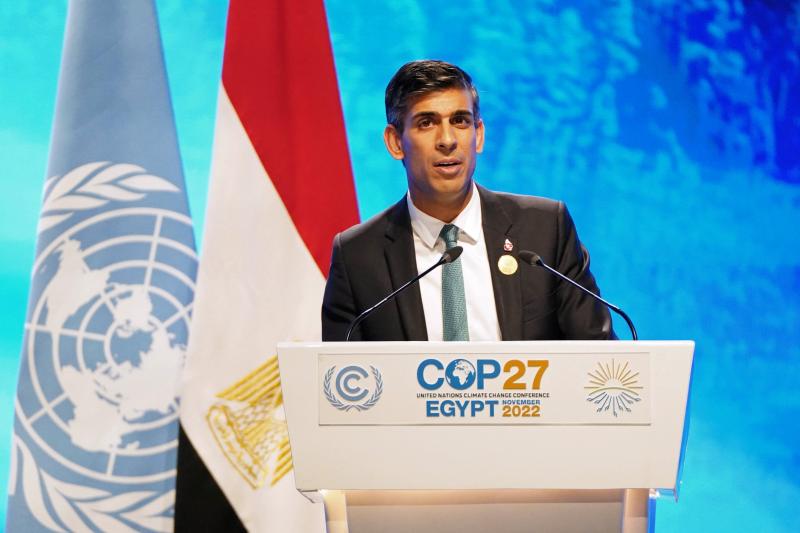09 Nov 2022
Soon after entering 10 Downing Street as Prime Minister, Rishi Sunak said he’d be too busy with “other pressing domestic commitments” to attend the climate talks in Egypt.
Following widespread criticism he attended, although he’s kept discredited Liz Truss’s bar on King Charles, UK Head of State, from joining the talks, which will round off the UK’s year – starting at COP26 in Glasgow – of leading the global negotiations to keep our climate safe and stable.
Announcing his decision to attend, PM Sunak said, “There is no long-term prosperity without action on climate change. There is no energy security without investing in renewables. That is why I will attend COP27 next week: to deliver on Glasgow’s legacy of building a secure and sustainable future.”
The idea that UK matters are separate from the world climate talks always looked foolhardy when, just days after Sunak became PM, 3 authoritative bodies warned how climate is a domestic threat requiring sustained action now, not at some vague point in the future.
Three warnings for the UK
Two bodies reported how the UK isn’t immune to climate change and how both health and national security threats are growing. And despite PM Sunak and his ministers talking about how the UK is leading action to curb the climate crisis, data from the government itself shows how far off track it is when it comes to cutting dangerous carbon emissions.
Climate is frequently viewed as a long-term issue. Politicians often say 2040 and 2050 are a long way away and other issues need to take priority. But the following warnings show how climate effects are here and now, and that we can’t wait another 2 decades to act. We urgently need to get on track.
“Dereliction of duty,” says UK parliament
Firstly, a national security committee of both elected MPs and House of Lords peers reported that there’s “overwhelming evidence that the effects of climate change are already with us,” and warned that “poor adaptation to climate change is a major threat to the UK’s national security and prosperity”.
The parliamentarians lambasted ministers for not taking the risks seriously. They identified “a severe dereliction of duty on the part of the government,” adding that “it’s hard to imagine the Government taking such a lax approach to any other recognised national security risk.” Ouch!
“Health security concern,” says UK Health Security Agency
Next, the UK Health Security Agency said climate change is a significant risk and growing threat to people's health in the UK: "There is no doubt that our changing climate is a growing health security concern."
Climate action off track, government data shows
Lastly, the government itself warned about its own lack of adequate progress. In forecasts that contrast with government claims that the UK is leading the world on climate action, new figures show we’re on course to overshoot targets we need to hit to keep our climate safe and stable by staying within the UK's carbon budget.
Data from the government’s Department for Business, Energy and Industrial Strategy show the UK is way off the scale needed to cut and control dangerous, climate-wrecking emissions.
The carbon budget requires a 76% cut in emissions by the mid-2030s, but the government forecasts that the UK is set to miss this target by a whopping 976 million tonnes. For comparison, the UK energy sector produces around 80 million tonnes of carbon dioxide per year, and our homes emit about 65 million tonnes.
Three global warnings
None of the above warnings should surprise serious politicians who are paying attention instead of insisting that the UK is leading or even beating the rest of the world on climate action.
The UK may be in the lead when compared with many other nations, but leading a race everyone’s losing is hardly a win.
These reports also underline the importance of each year’s climate talks. The negotiations are a rolling process to get and keep every nation on track. It’s not just a matter of staging glossy events every 5 years such as the Glasgow COP26 talks the UK hosted in November 2021.
If PM Sunak and his ministers don’t understand how the UK’s growing insecurity fits into the global picture, they should check out 3 further authoritative reports, also issued in the PM’s first week.
Health undermined, says The Lancet
Firstly, The Lancet Countdown report on health and climate revealed rising deaths from excessive heat and the spread of infectious diseases – both linked to climate change.
The Lancet also said fossil fuel companies profiting from oil and gas extraction are undermining people's lives. Let’s read that again – yes, the report explicitly links ongoing investment in and profits from oil and gas (which we can’t afford to burn anyway if we want to keep our climate safe and stable) with the undermining of people’s health.
The report also highlighted how governments are making matters worse by continuing to pour public money into the exploration and production of fossil fuels.
The UK has said it’ll stop supporting fossil fuel extraction overseas, but exploitation in the UK will continue. Whether a tonne of carbon is released in the UK or anywhere else is neither here nor there to a warming planet.
But the UK’s insistence on remaining hooked on fossil fuels does raise the issue of the so-called “windfall tax” – the energy profits levy Rishi Sunak introduced when he was Chancellor of the Exchequer.
A word about the weak “windfall tax”
The tax may sound great, but in reality it sees lots of climate-wrecking oil and gas flowing and not much money trickling into the public purse.
That’s because for every £1 paid by oil and gas companies, they get 91p back in tax relief if they “invest” in UK energy. That could mean boosting renewable energy, but it mainly means more oil and gas, deepening the climate crisis and costing consumers more than clean energy from cheap renewables.
Shell doubled its profits to $9.5 billion in the July-September 2022 quarter compared with the same period in 2021. And its profits after three-quarters of the financial year exceed $30 billion, with more to come before the year ends.
Despite making record profits, Shell easily avoids the levy simply by investing in more North Sea oil and gas production, as Shell’s finance chief Sinead Gorman confirms: “We simply are investing more heavily than we have, and therefore we don’t have profits which we can be taxed against.”
BP also reported large third-quarter profits of £7.1 billion ($8.2 billion). That’s less than its second quarter but is helped by oil and gas price rises due to Russia's invasion of Ukraine and, as BP put it, “exceptional gas marketing and trading result and higher gas realizations.”
Unlike Shell, BP will pay around £700 million ($800 million) in ”windfall tax” on the 10% of its profits that come from its UK operations. But the amount is still lessened because of the way the levy is currently reduced if oil and gas companies invest in more fossil fuels.
As part of his domestic focus, PM Sunak should reform the energy profits levy by removing the incentive to exploit more dirty energy and to subsidise companies that are already reaping in profits.
Safe and stable, says energy authority
Next, the International Energy Authority (IEA) said governments should be investing in energy efficiency but instead are rushing toward, not away from, fossil fuels.
It said there’s “scant evidence” that climate and net zero policies are to blame for the energy crisis (which was in train before Russia invaded Ukraine), and that investing in clean renewable energy and more fuel-efficient homes not only helps the climate but also results in lower prices, providing “an important buffer for some – but far from enough – consumers.” Proper investment would see everyone benefiting.
Meeting pledges on climate would produce the stability governments say they want. The IEA said: “Full achievement of all climate pledges would move the world towards safer ground, but there is still a large gap between today’s ambitions and a 1.5°C stabilisation.”
Too darn hot, says the UN
Lastly, ahead of this year’s COP27 talks and 1 year on from COP26 in Glasgow where nations agreed to “keep 1.5°C alive,” the UN says that this safe temperature level risks being breached, and instead of sticking within 1.5°C or even safer levels risks pushing close to 3°C – double what scientists say is safe.
The Lancet report also warned that, despite 2022 being the 30th anniversary of the global climate deal – the UN Framework Convention on Climate Change (UNFCCC), – the lack of meaningful action by most governments to make good on last year’s COP26 deal is now putting the world on track to a catastrophic 2.7°C rise by 2100.
“Just a gathering of people in Egypt”?
Before Rishi Sunak changed his mind, the final event in the UK’s year as President of the global climate talks was to be attended by a junior minister not even in the Cabinet.
Environment Secretary Thérèse Coffey – who has frequently voted against measures to curb climate change – had also downplayed COP27 as “just a gathering of people in Egypt,” adding that “the big push happened last year in Glasgow.”
It’s almost as if the UK has lost interest since hosting COP26, forgetting that climate action needs both negotiations – too many of which have failed to deliver – and follow-through, because the serious work is delivering on the pledges made at the talks.
Seemingly unaware of what other governments are doing, Coffey said, “I am not aware of, say, President Biden or President Macron, or any of those other people will be there (in Egypt). It is quite standard practice that every five years is the big political gathering.”
She added: “Normally, the big COPs tend to be every five years, the United Kingdom hosted that last year where we had attendance from many members of the royal family, but in between it tends to be – I’m not going to say low key – but not quite the same level of heads of state and prime ministers attending."
Well, the President of the USA, Joe Biden, and the President of France, Emmanuel Macron, are attending.
And while a government spokesperson reaffirmed the UK’s commitment – “We remain committed to net zero and to leading international and domestic action to tackle climate change. The UK is forging ahead of many other countries on net zero," – the UN report said the time since COP26 has been a “wasted year” with “woefully inadequate” progress on the pledges made there.
UK leadership in doubt
Rishi Sunak did attend the UK-hosted Glasgow talks, turning up as the “green Chancellor” by showing off a green budget box instead of the usual red one.
The stunt, albeit backed by commitments to direct money into climate action, would be truly meaningful if chancellors’ main annual budgets were actually green, instead of being used to entrench the climate crisis.
A look at Mr Sunak’s budgets shows funding cuts to insulating cold homes. At the same time, they reveal cuts to air passenger duty for short-haul domestic flights, and funding boosts for harmful new roads, many of which the government itself says are poor value for public money.
And the UK is way off track as the above reports show. Two other events this summer, when PM Sunak was still Chancellor, should also figure in his focus on domestic matters:
- Ministers were advised by the independent UK Climate Change Committee of significant gaps in the government’s plan to hit its own net zero goal, and
- The High Court backed Friends of the Earth’s case that the government has failed to set out how it would meet its net zero plan.
It’s not clear that, as Chancellor, Sunak took climate as seriously as he says he does now that he’s Prime Minister. Our politicians shouldn’t have to get the top job to act, and climate change requires action across all government departments.
But now that he’s PM, as Friends of the Earth’s campaigner Tony Bosworth says: “The new Prime Minister mustn’t wait until legally obliged before raising his government’s ambition on climate and rebuilding the UK’s reputation internationally.” He can make an enormous difference to both the cost-of-living and climate emergencies today through solutions such as rolling out a nationwide insulation programme and unlocking the UK's full potential for renewable energy.
As these 3 national and 3 international warnings highlight, the UK is failing miserably on climate action, both at home and on the global stage. It’s vital that PM Sunak and his government take the global climate talks seriously if we have any hope of becoming the climate world leader they claim us to be – his U-turn decision to attend is one small step in the right direction.




